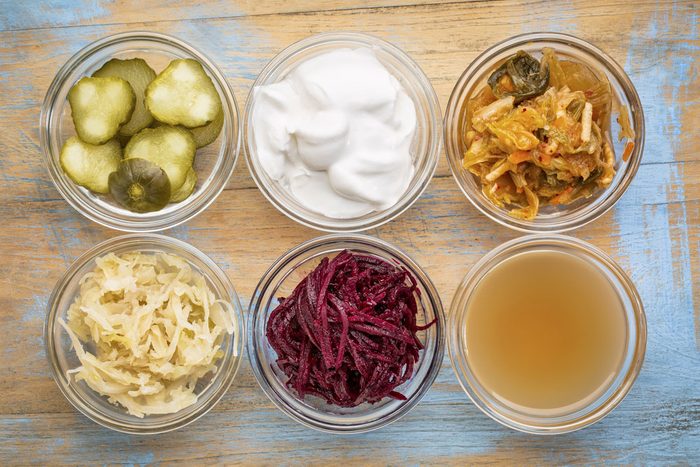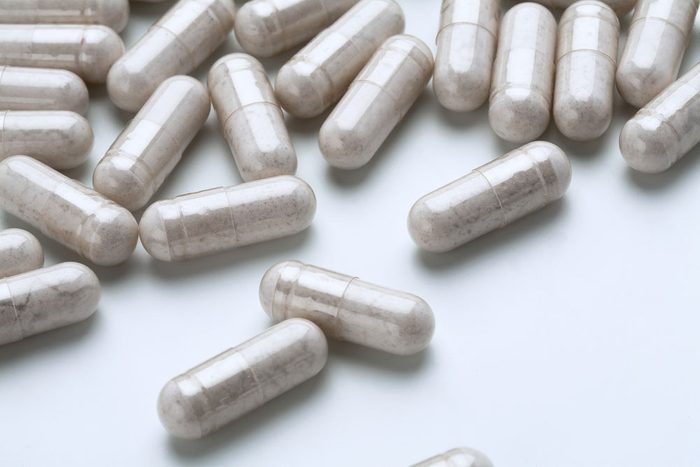1. Avoid Antibiotics if Possible
The microbiome is a collection of microorganisms that reside in the gut. “They play a role in every metabolic process in our bodies, including brain and immune function,” says nutritional consultant Tracey Reed. When the microbiome is out of whack, meaning there is an imbalance of bacteria, it can contribute to just about every chronic health condition there is—from Parkinson’s or Multiple Sclerosis to asthma, allergies, and even mental health. When we use antibiotics to treat infections, the medicine doesn’t just kill the bacteria causing the illness; it also kills beneficial bacteria. The microbiome can then take nine to 12 months to return to a healthy state. Of course, if antibiotics are necessary, you should follow your doctor’s recommendations and make an informed health decision for yourself.
2. Limit Anti-Inflammatory Drugs, Antacids and Birth Control Pills
Antibiotics aren’t the only drugs that can harm the microbiome. Birth control pills, as well as over-the-counter meds like non-steroidal anti-inflammatory drugs (Ibuprofen, Aspirin) and antacids can also interact with healthy gut bacteria and cause an imbalance in bacteria strains.
3. Eat Probiotic-Rich Foods
Reed suggests filling your diet with fermented foods, which are rich in healthy bacteria and can strengthen a weak gut. Try plain yogurt with active cultures, kefir, unpasteurized sauerkraut, kimchi and kombucha. Reed even likes to make her own fermented mayonnaise and ketchup at home. “After I make homemade mayonnaise or ketchup, I take some juice from a sauerkraut or other fermented vegetable and add it to the mixture,” she says. “Then I leave it at room temperature to ferment.” So easy!
4. Integrate Prebiotics, Too
Prebiotics are plant fibres that feed probiotics, which means that the two can interact in the gut and strengthen the probiotics in your gastrointestinal (GI) tract. Some foods that have extremely high levels of prebiotics are asparagus, leeks, onions, dandelion greens and sunchokes, which are also known as Jerusalem artichokes.
5. Skip Sugar
Many North Americans have a diet that’s high in processed foods, sugar and carbohydrates. Sweets, as well as breads and pastas, break down into sugars during the digestive process and feed gut bacteria, allowing opportunistic bacteria strains to become more dominant. This shift in the natural bacteria ratio, which results in an imbalance, is called dysbiosis. Try to minimize sugar and carbs when possible to prevent the growth of “bad” bacteria.
6. Space Meals 3-4 Hours Apart
“For proper gut motility to occur, it’s best to leave three to four hours between meals,” says Reed. While the spacing of meals doesn’t directly impact gut flora, it does support the overall health of the GI tract and a healthy microbiome if its home is unhealthy.
7. Add Supplements
Support the health of your GI tract by introducing cod liver oil or digestive enzymes into your daily routine. It’s also possible to find high quality probiotic supplements, if you find it difficult to eat fermented food.
8. Catch Some Zzzs
“Cortisol, the hormone associated with the stress response, has a damaging impact on the microbiome,” says Reed, “whether it’s an acute episode or chronic, ongoing stress.” To reduce cortisol in your body, make sure you’re getting around eight hours of sleep each night, or taking naps as necessary. Good sleep hygiene can impact the quality of your sleep, so turn off electronics an hour before bed and make your bedroom a dark, sleep- and sex-only zone.
9. Get Moving
Moderate exercise is another great way to manage stress and minimize the impact of cortisol because it pumps up endorphins—the neurotransmitters that make us feel good—and improves sleep. That said, extreme exercise, which puts stress on the body, could have the opposite effect and damage the microbiome.
10. Meditate
Stress management looks different from person to person, so try to find additional tools that work for you. Your tool kit could include meditation, deep breathing, colouring, cooking or sitting outside in nature. Whatever helps you to relax and forget the stresses of work and family is a much-needed addition to your day.










